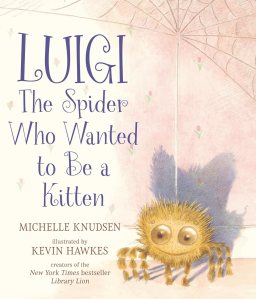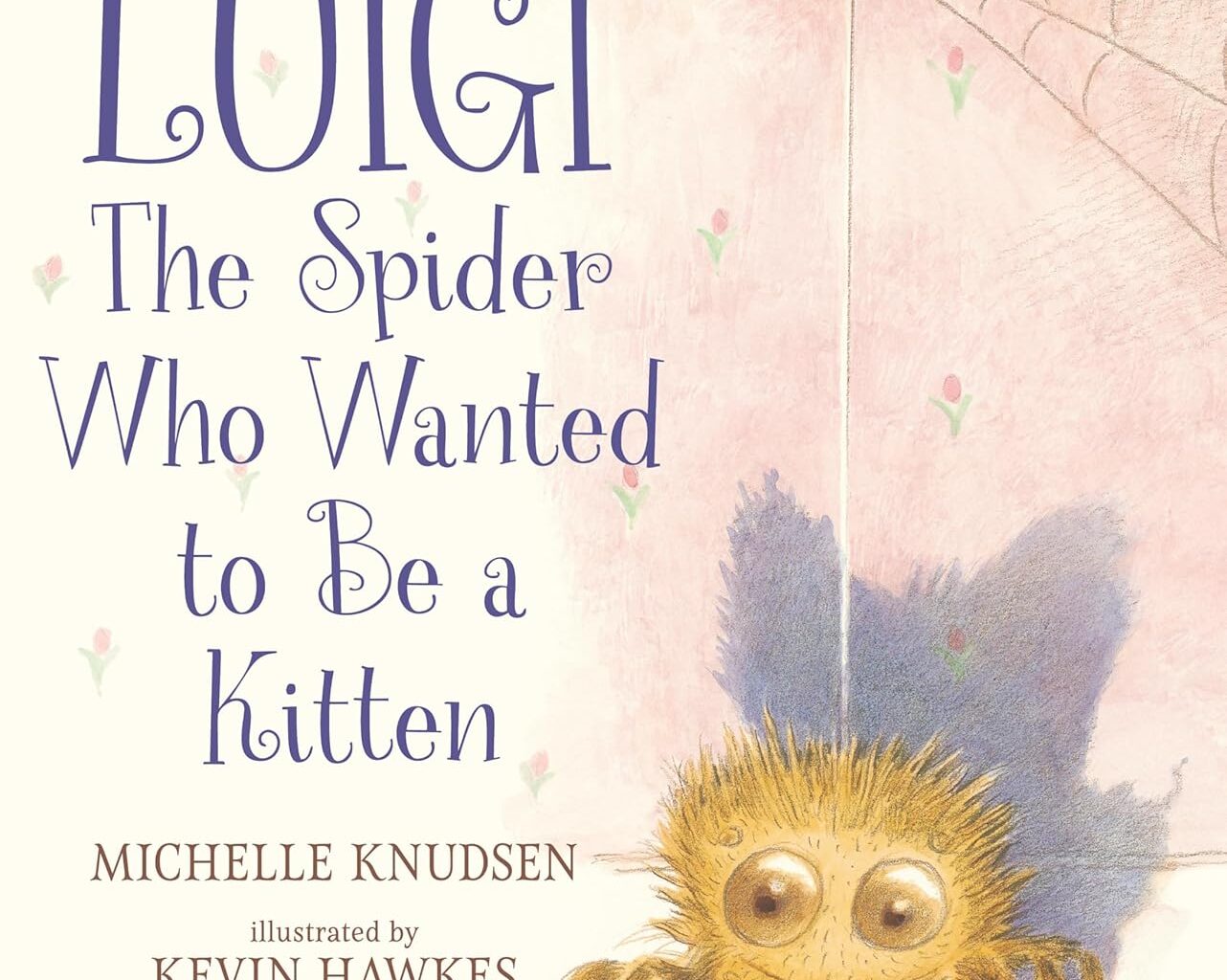Eighteen years after teaming up to create the New York Times bestselling “Library Lion,” author Michelle Knudson and illustrator Kevin Hawkes have done it again, with another heartwarming tale of a scary critter trying to fit into a world that is wary of it. “Luigi, the Spider Who Wanted to Be a Kitten” falls short of the inspired “Library Lion,” but it succeeds in taking a light-hearted and engaging look at the importance of being true to one’s real self.
 “Luigi, the Spider Who Wanted To Be a Kitten” By Michelle Knudson. Illustrated by Kevin Hawkes. Candlewick Press. Ages 4-8. 40 pages. $18.99
“Luigi, the Spider Who Wanted To Be a Kitten” By Michelle Knudson. Illustrated by Kevin Hawkes. Candlewick Press. Ages 4-8. 40 pages. $18.99
This time around we’re not dealing with a lovable lion worrying he doesn’t belong in a library, but a hairy spider trying desperately to pretend he’s not a spider. The book’s title is something of a misnomer: First, the spider’s name is not Luigi. And secondly, he has no pretensions to kittendom until the lady of the house abruptly snatches him from his dark and comfy hiding place under an old sofa. “I have always wanted a kitten,” Betty exclaims. She dubs him Luigi, and proceeds to treat him like a feline.
Even though he is “pretty sure his name was not Luigi” and “very sure he was not a kitten,” “Luigi” somehow feels he has to live up to Betty’s expectations. So he tries valiantly to play along, eating Betty’s kitten food, chasing Betty’s kitten toys and snuggling on the couch with her.
He begins to notice that kittens have a pretty good life. “Spiders had to live alone in dark corners. But kittens… kittens got to have friends.” He decides to be a kitten, and literally ties himself in knots to act and even look like one. “He pretended so hard, he almost believed it himself.” And yet he lived in fear of being found out.
In the end, of course, he is found out, but the story has a reassuring message — that you don’t need to pretend to be anything you’re not. Even a spider is lovable. The message of acceptance is an important one, and one that will hit home for many kids. But the plot, which is slow and improbable, and the delivery of this message are the weakest parts of the book.
Why, for example, does Betty pretend Luigi is a kitten, when, as it turns out, she knew all along he was a spider? And when she tells him, “I like you for who you really are,” it’s a lovely sentiment, but surely there is a less-trite way to express it?
Surprisingly, it is the art that carries this story. Surprising because, how do you do make a creature like a Luigi relatable, not to mention lovable? While Lions are an illustrator’s dream — soft and furry, with expressive faces; heck, even their tails can convey emotion — spiders don’t really even have faces. Furthermore Luigi is described as “big and hairy” with “long, bristly creepy-crawly legs.”
I once wrote a picture book story about a spider and was assured that no one would publish it because spiders were icky and impossible to illustrate in a way kids could respond to. “Did E. B. White have this problem?” I asked myself. (The answer is yes, he did, but he found an illustrator who could handle it.)
Similarly, Kevin Hawkes, a Gorham resident and illustrator of over 50 books, has risen to the challenge here. He finds ways for Luigi to win our hearts. His Luigi has huge, expressive eyes. His bristly hair looks more like soft fur. We laugh at Luigi’s efforts to disguise himself as a kitten by using two legs to create “triangle ears” and another to create a furry “tail.” And the sight of Luigi trying to nuzzle a coffee mug, cat-style, is just plain aw-shucks cute. Hawkes uses a subdued pink/purple palette to create a soothing atmosphere that is further enhanced by the old-fashioned setting of Betty’s quaint house, with its floral sofas and round-shouldered fridge. The overall effect is a gentle tale about an endearing character you cannot help but root for.
A final note on the illustrations: I always appreciate little illustrator-added jokes, like Betty’s cat slippers and cats-eye glasses. But Hawkes misses out on a good one in the last illustration, which shows Betty and Luigi at day’s end cozily reading a children’s book. Sadly, the book is not “Charlotte’s Web.”
Amy MacDonald is the author of several children’s books, including “The Spider Who Created the World.” She lives in Portland and Vinalhaven.

